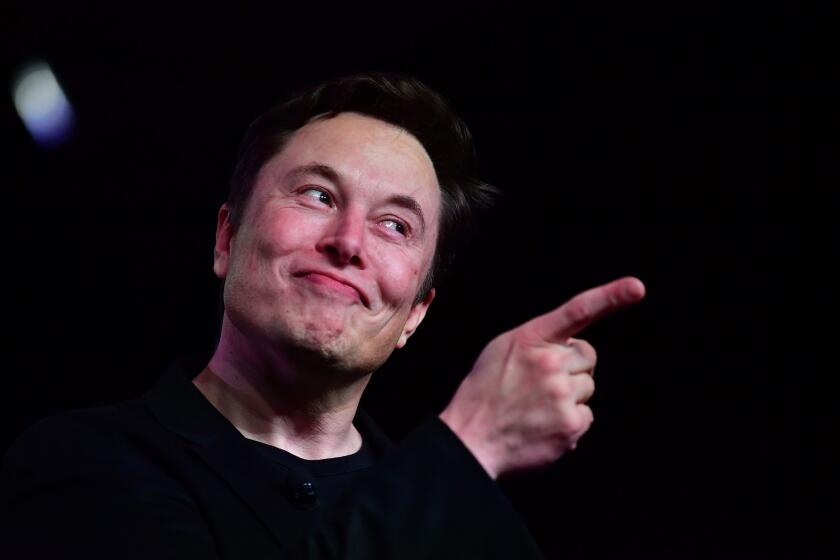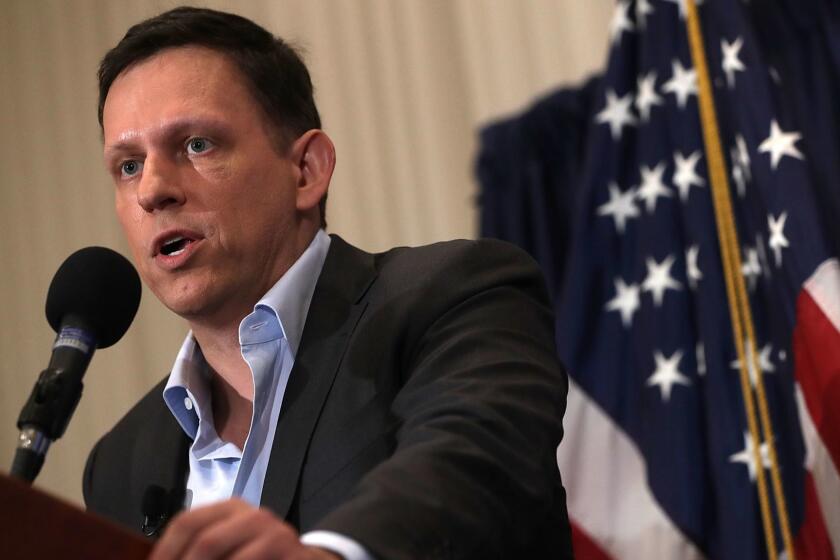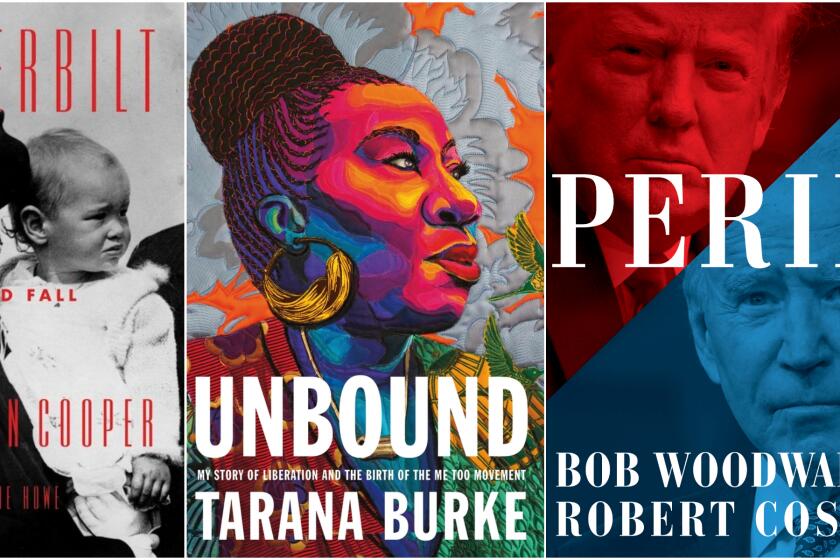Review: Does billionaire contrarian Peter Thiel contain multitudes? A biography weighs in
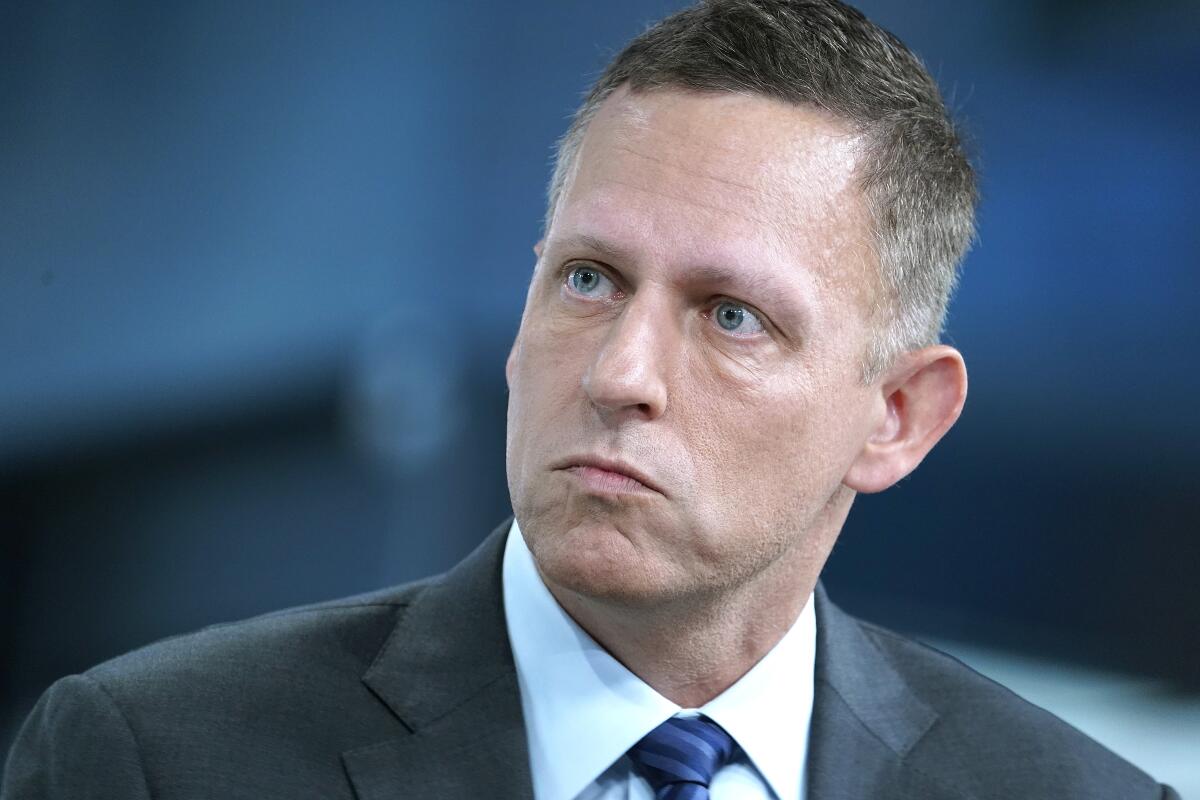
- Share via
On the Shelf
The Contrarian: Peter Thiel and Silicon Valley's Pursuit of Power
By Max Chafkin
Penguin: 400 pages, $28
If you buy books linked on our site, The Times may earn a commission from Bookshop.org, whose fees support independent bookstores.
In the third episode of the HBO sitcom “Silicon Valley,” Peter Gregory, a brilliant but socially awkward investor, encounters a fast-food hamburger bun for seemingly the first time. Contemplating its sesame seeds, he has a flash of oblique insight: A rare confluence of cicada broods will soon decimate sesame crops, driving up its commodity price. Gregory loads up on sesame futures and reaps a $68-million profit.
With his glitching-robot mannerisms and anti-establishment obsessions, Gregory was an obvious sendup of Peter Thiel, the billionaire venture capitalist, Facebook board member and erstwhile Trump campaign donor. (The show’s creator, Mike Judge, has denied Gregory was based on Thiel, which was probably wise of him given the way Thiel has gone after others for mocking him.)
In his real-life career as a macro hedge fund investor betting on global economic trends, Thiel was somewhat less clairvoyant than his supposed fictional doppelganger. In early 2008, then running a firm called Clarium Capital, he believed the world financial system was on the verge of a meltdown. He wrote a letter to his investors “recommending prayer and repentance in lieu of investment analysis,” reports Max Chafkin in his entertaining and disturbing new biography “The Contrarian: Peter Thiel and Silicon Valley’s Pursuit of Power.”
Thiel was right about the meltdown but wrong about the particulars, mistiming it and then second-guessing himself in a bet on the recovery. It was a costly blunder; other fund managers who saw the crash coming made tens of billions of dollars on “the big short” while Clarium ended the year down. But no matter: Thiel would soon enough be worth at least $7 billion, thanks in large measure to a tax avoidance scheme of dubious legality. And his reputation as an unconventional visionary only compounded — particularly after another long-shot bet, on Trump winning the presidency, paid off.
The polarizing founder shows up a lot in ‘Power Play,’ Tim Higgins’ Tesla history — but usually in the role of a dramatic foil who will be overtaken.
Cultivating that reputation has been, in Chafkin’s telling, a crucial career strategy and consuming passion for Thiel. He came onto the national scene in 1995 as the co-author of “The Diversity Myth,” a broadside against political correctness and multiculturalism. Striving to establish himself as a public intellectual, his early efforts included “self-publishing books, paying to put on conferences, essentially paying for influence however and wherever he could,” Chafkin reports. Hilariously — to anyone familiar with his dour persona — he also co-hosted a public access TV show, published a NASCAR fan magazine and opened a San Francisco nightclub famed for its hookup-friendly co-ed bathrooms.
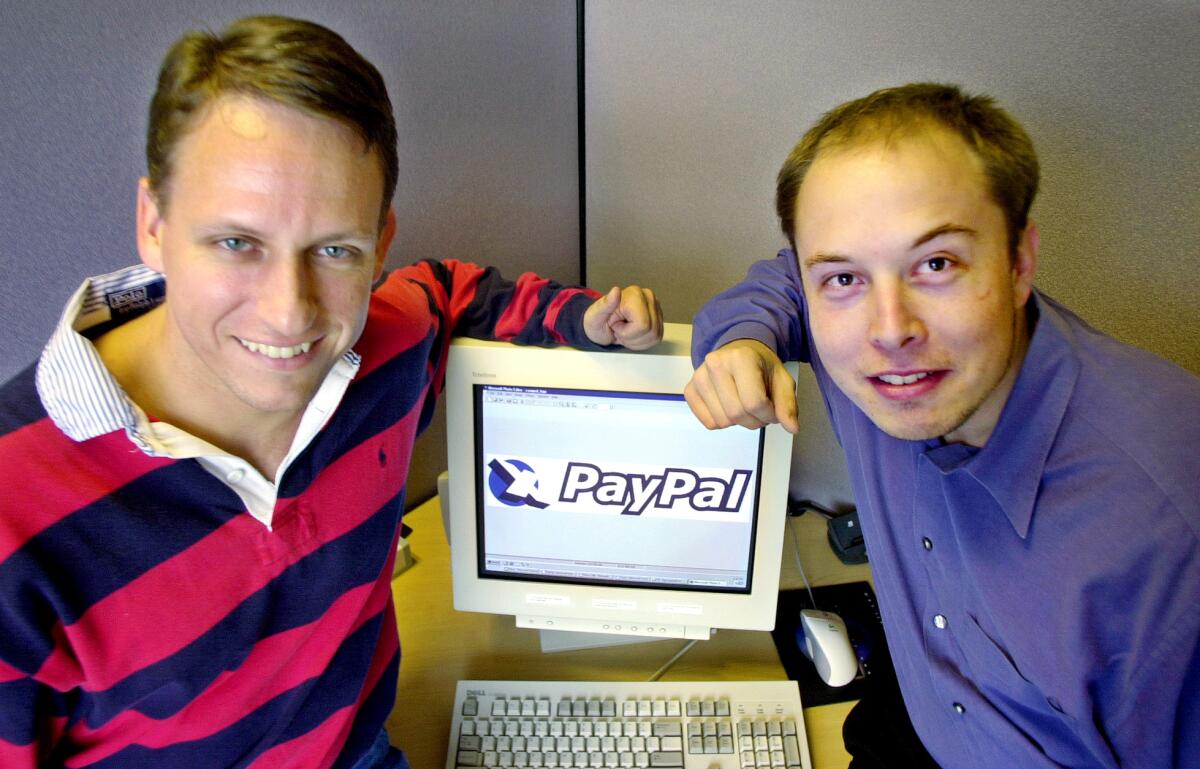
Somewhat later, having acquired a couple of dot-com fortunes and a better grasp of his personal brand, he created the Thiel Fellowship, a program that offered $100,000 grants to talented students willing to skip college to pursue a start-up or other project. It was vintage Thiel, equal parts prescient — student loan debt wouldn’t top the national discourse for another decade — and trollish. Not to mention self-serving: According to one of the program’s administrators, Thiel cooked up the whole thing as a PR stunt to distract attention from his unflattering portrayal in Aaron Sorkin’s film “The Social Network.”
But if Thiel desired to be seen as a genius iconoclast with world leaders on speed dial, he also frequently manifested a wish not to be seen at all. A devotee of the conservative political philosopher Leo Strauss, who believed rulers must conceal their true motives from the public, Thiel is an obscurantist whose strategic self-disclosure calls to mind the Winston Churchill maxim “In wartime, truth is so precious, she should always be attended by a bodyguard of lies.” (He once told me he was curious about human growth hormone but didn’t use it; only after publishing my story did I come across a TV interview in which he described taking it daily. I’m among the journalists whose reporting Chafkin cites in his acknowledgments.)
In 2016, Forbes reported that Thiel had secretly funded a $10-million legal campaign to put Gawker Media, a publisher of news and gossip blogs, out of business. The effort succeeded spectacularly after a jury awarded the wrestler Hulk Hogan $140 million in damages over Gawker’s publication of a sex tape. In an op-ed, Thiel suggested he was motivated by a 2007 blog post identifying him as gay. But Thiel’s associates have said that was only one of several overlapping justifications. In any case, even as he was secretly funding media-killing lawsuits, Thiel, via his foundation, was donating hundreds of thousands of dollars to the Committee to Protect Journalists.
“A foolish consistency is the hobgoblin of little minds,” Emerson wrote, and in this respect at least, Thiel’s intellect lives up to its billing. Among other things, Thiel is: an immigrant who advocates for a clampdown on immigration; a jingoistic nationalist who has sworn allegiance to the country of New Zealand; an advocate of greater government spending on science research who denies the scientific consensus on climate change; a devout Christian who (per Chafkin) hosts drug-fueled orgies and covets God-like immortality; and a privacy champion who founded a spyware company.
Controversial data-mining company Palanatir goes public with a governance structure that gives virtually all control to its co-founders, including Peter Thiel.
Thiel has frequently called himself a libertarian but, as Chafkin notes, he has long been more of a neo-reactionary, aligning with far-right factions calling for greater restrictions on global trade and the rights of marginalized groups. He’s the kind of libertarian who allegedly defends South African apartheid and disses the ACLU.
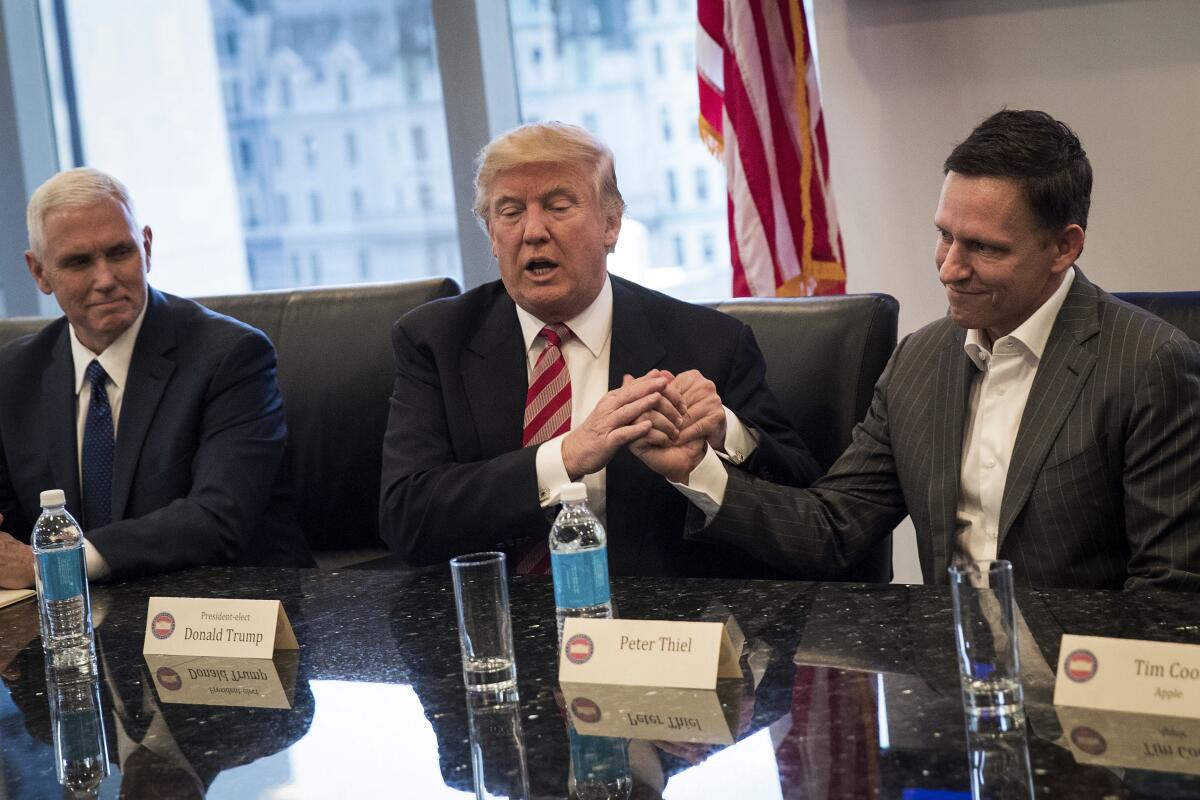
Thiel’s biography suggests several possible ways to reconcile these contradictions. A tournament-level chess player in his youth, he could be thinking several moves ahead, feinting to disguise his true strategy. The former hedge fund manager might think it prudent to hold contrasting positions, ready to profit off any turn of events. The Straussian statesman in him might think it necessary to shield any true convictions from public view; the philosophy student understands how each thing contains its opposite.
“My goal, in the pages that follow, is to try to understand a man who has made billions of dollars in part by being inscrutable,” Chafkin writes in his introduction. Understanding Thiel — who moved to Los Angeles in 2018, saying the Bay Area had become intolerant of conservatives, and who declined to be interviewed on the record — feels more urgent than ever. With his late-cycle endorsement of Trump, Thiel was essentially a tea-leaf reader, making a discounted bet on White House access. But now he’s attempting to be a true power broker, backing two of his proteges, J.D. Vance and Blake Masters, in U.S. Senate races.
In the end, the answer to the riddle of what Thiel truly believes is a disappointing one — not through any fault of Chafkin’s, but because his subject is less fascinating than he would have us believe. For all his intellectual horsepower, Thiel is a painfully recognizable type to anyone familiar with Tucker Carlson, Stephen Miller or Andrew Breitbart — all brainy conservatives who came of age in California, revolted by, and revolting against, its prevailing progressive mores. For all of them, hatred of a certain type of bien-pensant liberal is the only consistent through-line in otherwise jumbled politics.

Describing an election-night party Thiel held in 2016 where the Champagne flowed as state after state fell for Trump, Chafkin quotes an attendee, presumably a friend of Thiel’s: “The big attitude was, ‘I’m so happy everyone in Silicon Valley is unhappy about this.’” Never mind that Trump was destined to fail in ways foreseeable to anyone with a shred of insight into human nature, and to a degree that would leave Thiel declining to back his reelection bid. For a brief moment, the libs had been owned and that was all that mattered.
Big releases probe COVID-19’s origins, Anthony Bourdain’s life, Tarana Burke’s survivor story, the Vanderbilts and one last serving of Trump.
Thiel professes to be for many things — freedom, privacy, science, progress, human flourishing. In every case, it’s easy to find instances of him being against those things when it has meant a chance to increase his power or indulge his biases. Chafkin’s title has it exactly right: Thiel is a contrarian, a man who doesn’t truly stand for anything — only against. What could be more boring than that?
More to Read
Sign up for our Book Club newsletter
Get the latest news, events and more from the Los Angeles Times Book Club, and help us get L.A. reading and talking.
You may occasionally receive promotional content from the Los Angeles Times.
